HRM4001: Skills Development, PDP & Unilever Management Analysis
VerifiedAdded on 2023/06/12
|14
|3949
|110
Report
AI Summary
This report reflects on personal management and leadership skills using models like Gibbs' reflective cycle, applied in the context of a team leader role at Unilever. It details the experience of managing a project, including planning, task delegation, and conflict resolution. The report evaluates the importance of team integration, delegation, and leadership. A personal development plan is presented, focusing on leadership, motivation, problem-solving, and teamwork skills, with specific actions and timelines for improvement. Furthermore, it explains transferable skills such as supportive communication and motivation, using theories like the two-step flow theory and Maslow's hierarchy of needs, demonstrating their application within Unilever. The report concludes by emphasizing the value of these skills for personal and professional growth.
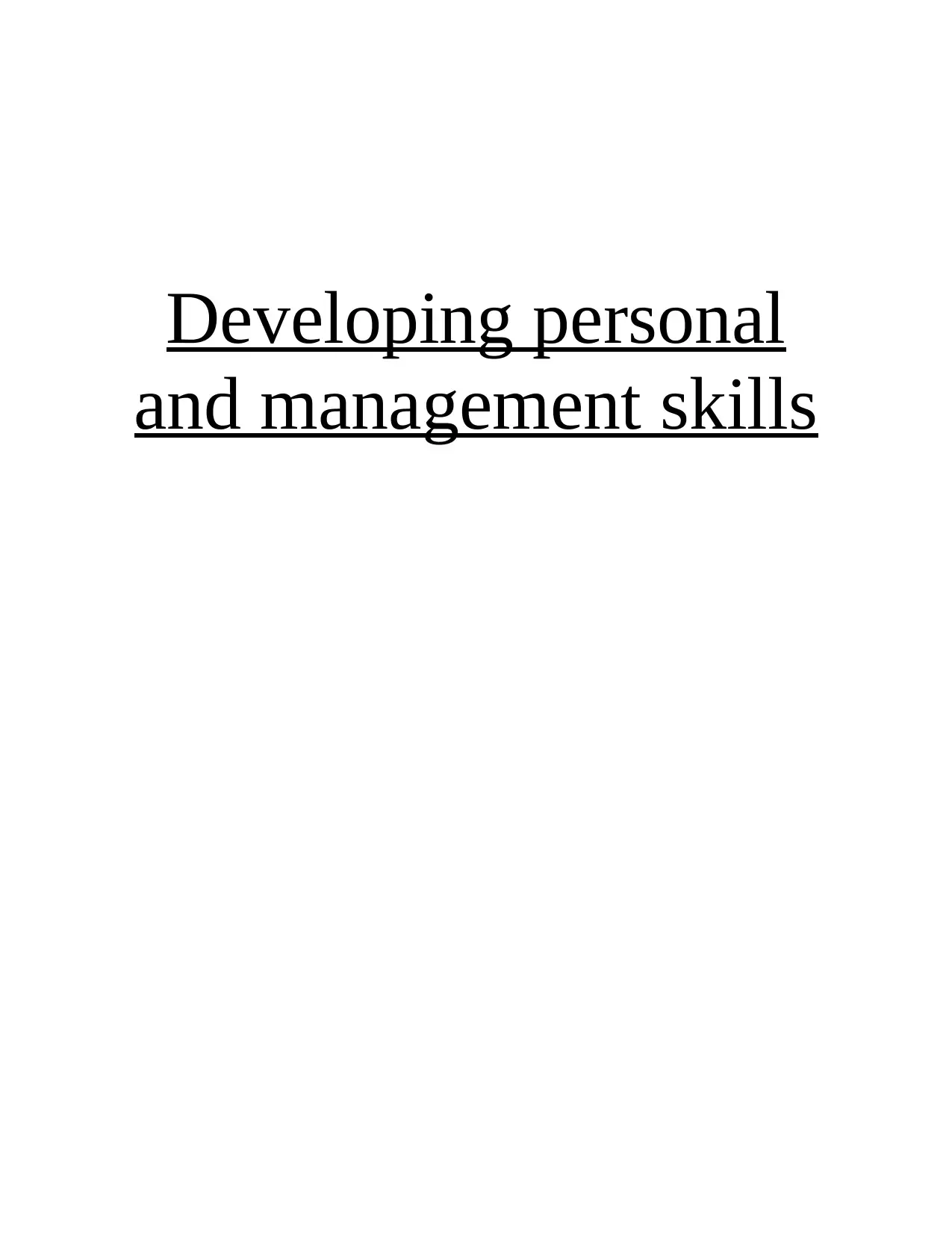
Developing personal
and management skills
and management skills
Paraphrase This Document
Need a fresh take? Get an instant paraphrase of this document with our AI Paraphraser
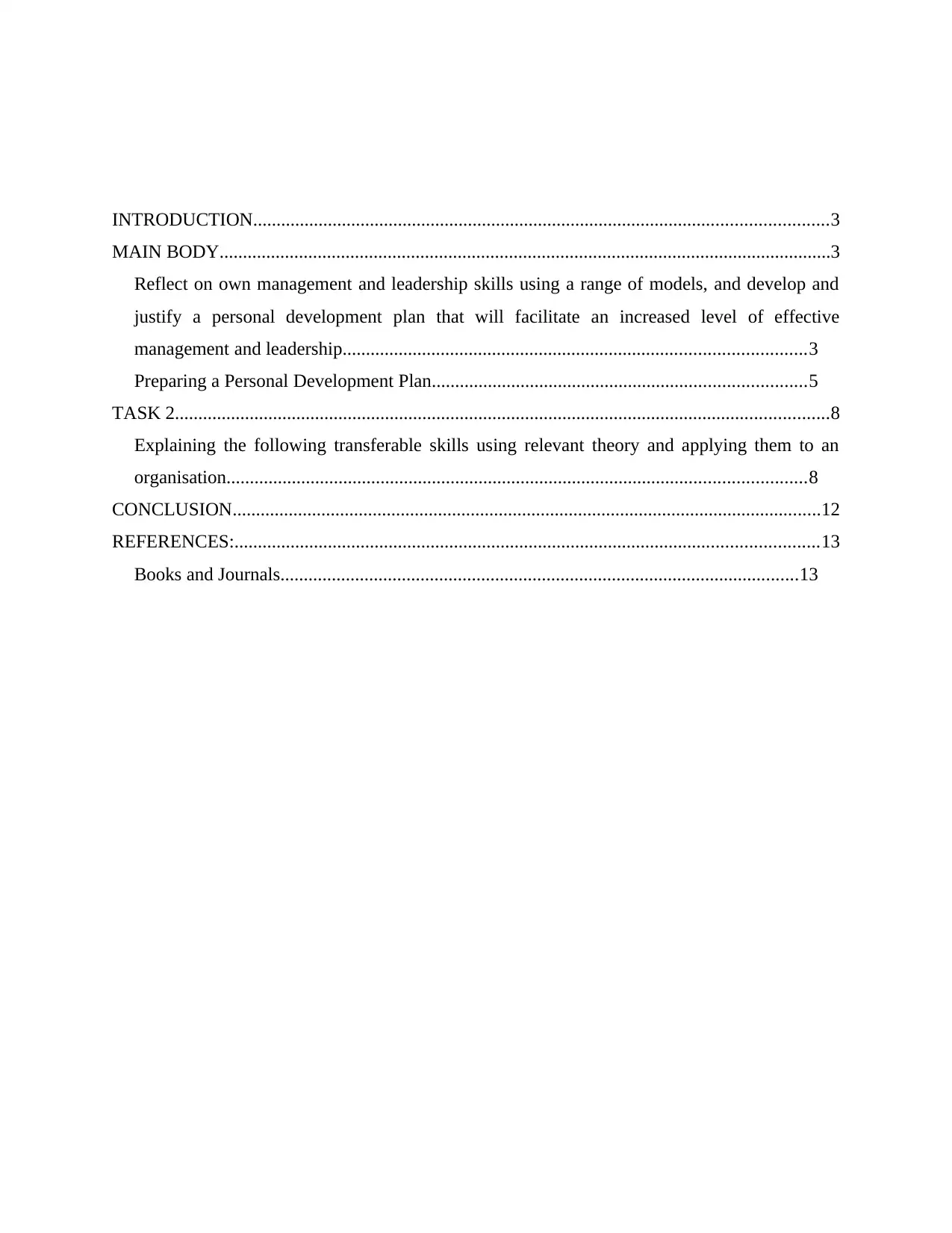
INTRODUCTION...........................................................................................................................3
MAIN BODY...................................................................................................................................3
Reflect on own management and leadership skills using a range of models, and develop and
justify a personal development plan that will facilitate an increased level of effective
management and leadership...................................................................................................3
Preparing a Personal Development Plan................................................................................5
TASK 2............................................................................................................................................8
Explaining the following transferable skills using relevant theory and applying them to an
organisation............................................................................................................................8
CONCLUSION..............................................................................................................................12
REFERENCES:.............................................................................................................................13
Books and Journals...............................................................................................................13
MAIN BODY...................................................................................................................................3
Reflect on own management and leadership skills using a range of models, and develop and
justify a personal development plan that will facilitate an increased level of effective
management and leadership...................................................................................................3
Preparing a Personal Development Plan................................................................................5
TASK 2............................................................................................................................................8
Explaining the following transferable skills using relevant theory and applying them to an
organisation............................................................................................................................8
CONCLUSION..............................................................................................................................12
REFERENCES:.............................................................................................................................13
Books and Journals...............................................................................................................13
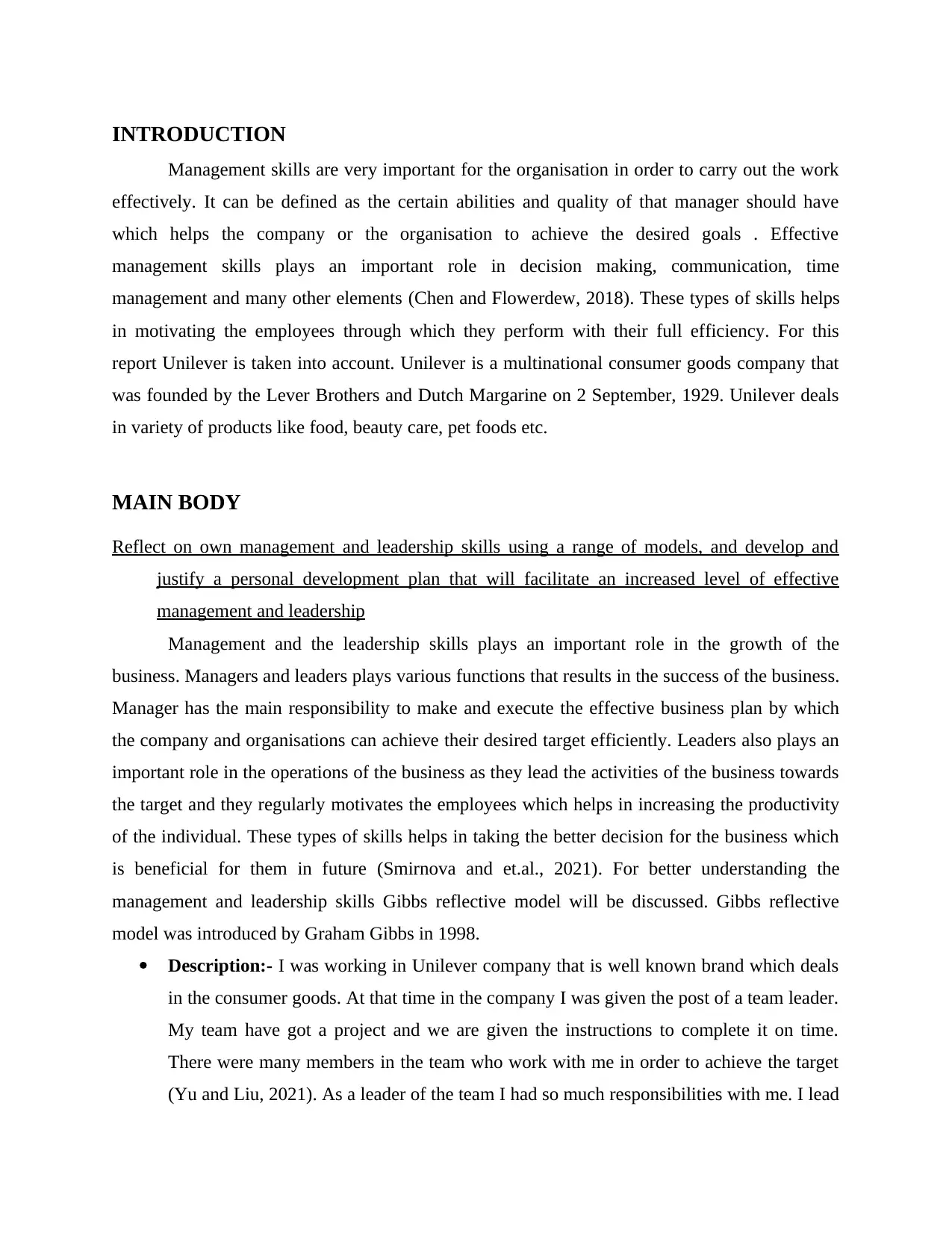
INTRODUCTION
Management skills are very important for the organisation in order to carry out the work
effectively. It can be defined as the certain abilities and quality of that manager should have
which helps the company or the organisation to achieve the desired goals . Effective
management skills plays an important role in decision making, communication, time
management and many other elements (Chen and Flowerdew, 2018). These types of skills helps
in motivating the employees through which they perform with their full efficiency. For this
report Unilever is taken into account. Unilever is a multinational consumer goods company that
was founded by the Lever Brothers and Dutch Margarine on 2 September, 1929. Unilever deals
in variety of products like food, beauty care, pet foods etc.
MAIN BODY
Reflect on own management and leadership skills using a range of models, and develop and
justify a personal development plan that will facilitate an increased level of effective
management and leadership
Management and the leadership skills plays an important role in the growth of the
business. Managers and leaders plays various functions that results in the success of the business.
Manager has the main responsibility to make and execute the effective business plan by which
the company and organisations can achieve their desired target efficiently. Leaders also plays an
important role in the operations of the business as they lead the activities of the business towards
the target and they regularly motivates the employees which helps in increasing the productivity
of the individual. These types of skills helps in taking the better decision for the business which
is beneficial for them in future (Smirnova and et.al., 2021). For better understanding the
management and leadership skills Gibbs reflective model will be discussed. Gibbs reflective
model was introduced by Graham Gibbs in 1998.
Description:- I was working in Unilever company that is well known brand which deals
in the consumer goods. At that time in the company I was given the post of a team leader.
My team have got a project and we are given the instructions to complete it on time.
There were many members in the team who work with me in order to achieve the target
(Yu and Liu, 2021). As a leader of the team I had so much responsibilities with me. I lead
Management skills are very important for the organisation in order to carry out the work
effectively. It can be defined as the certain abilities and quality of that manager should have
which helps the company or the organisation to achieve the desired goals . Effective
management skills plays an important role in decision making, communication, time
management and many other elements (Chen and Flowerdew, 2018). These types of skills helps
in motivating the employees through which they perform with their full efficiency. For this
report Unilever is taken into account. Unilever is a multinational consumer goods company that
was founded by the Lever Brothers and Dutch Margarine on 2 September, 1929. Unilever deals
in variety of products like food, beauty care, pet foods etc.
MAIN BODY
Reflect on own management and leadership skills using a range of models, and develop and
justify a personal development plan that will facilitate an increased level of effective
management and leadership
Management and the leadership skills plays an important role in the growth of the
business. Managers and leaders plays various functions that results in the success of the business.
Manager has the main responsibility to make and execute the effective business plan by which
the company and organisations can achieve their desired target efficiently. Leaders also plays an
important role in the operations of the business as they lead the activities of the business towards
the target and they regularly motivates the employees which helps in increasing the productivity
of the individual. These types of skills helps in taking the better decision for the business which
is beneficial for them in future (Smirnova and et.al., 2021). For better understanding the
management and leadership skills Gibbs reflective model will be discussed. Gibbs reflective
model was introduced by Graham Gibbs in 1998.
Description:- I was working in Unilever company that is well known brand which deals
in the consumer goods. At that time in the company I was given the post of a team leader.
My team have got a project and we are given the instructions to complete it on time.
There were many members in the team who work with me in order to achieve the target
(Yu and Liu, 2021). As a leader of the team I had so much responsibilities with me. I lead
⊘ This is a preview!⊘
Do you want full access?
Subscribe today to unlock all pages.

Trusted by 1+ million students worldwide
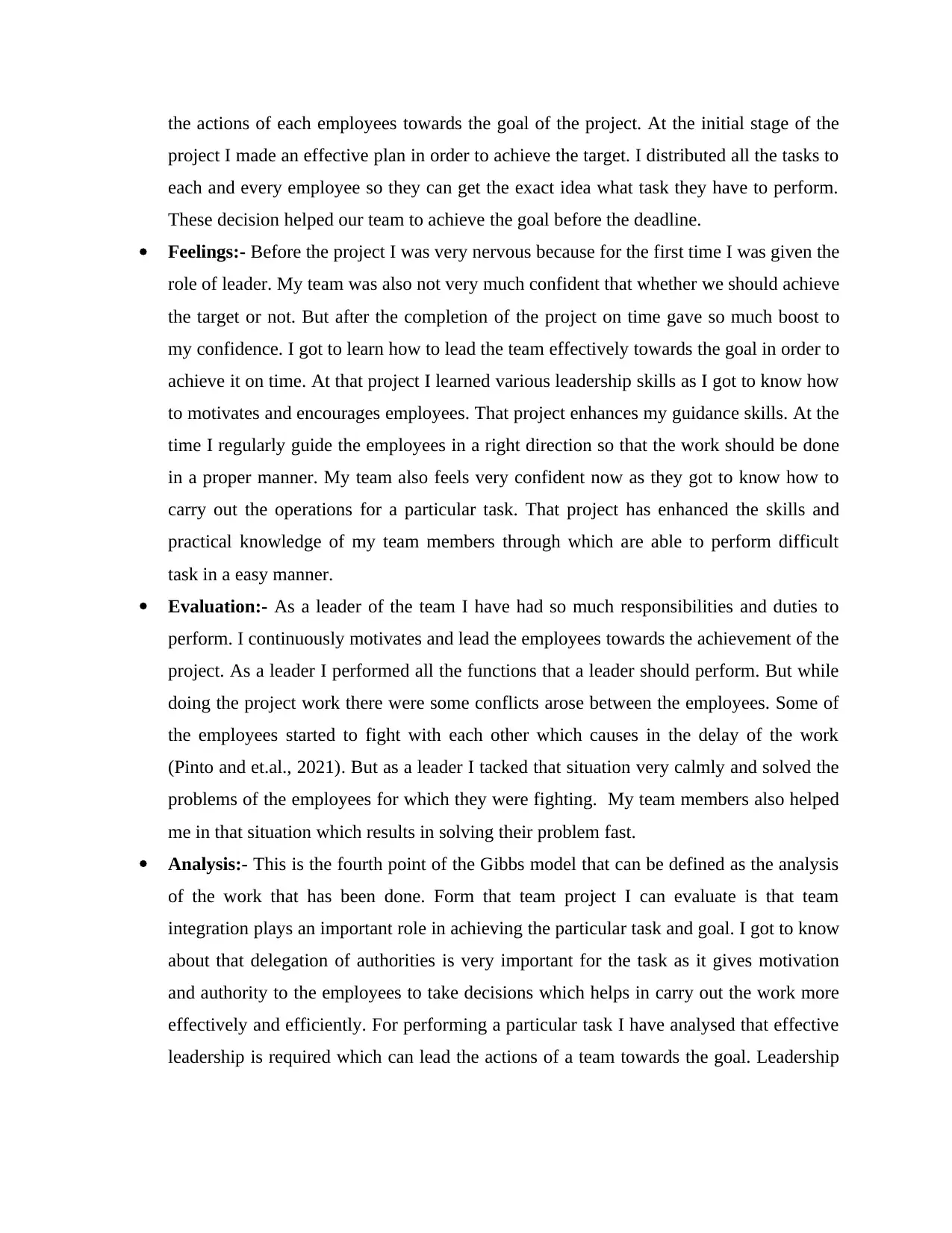
the actions of each employees towards the goal of the project. At the initial stage of the
project I made an effective plan in order to achieve the target. I distributed all the tasks to
each and every employee so they can get the exact idea what task they have to perform.
These decision helped our team to achieve the goal before the deadline.
Feelings:- Before the project I was very nervous because for the first time I was given the
role of leader. My team was also not very much confident that whether we should achieve
the target or not. But after the completion of the project on time gave so much boost to
my confidence. I got to learn how to lead the team effectively towards the goal in order to
achieve it on time. At that project I learned various leadership skills as I got to know how
to motivates and encourages employees. That project enhances my guidance skills. At the
time I regularly guide the employees in a right direction so that the work should be done
in a proper manner. My team also feels very confident now as they got to know how to
carry out the operations for a particular task. That project has enhanced the skills and
practical knowledge of my team members through which are able to perform difficult
task in a easy manner.
Evaluation:- As a leader of the team I have had so much responsibilities and duties to
perform. I continuously motivates and lead the employees towards the achievement of the
project. As a leader I performed all the functions that a leader should perform. But while
doing the project work there were some conflicts arose between the employees. Some of
the employees started to fight with each other which causes in the delay of the work
(Pinto and et.al., 2021). But as a leader I tacked that situation very calmly and solved the
problems of the employees for which they were fighting. My team members also helped
me in that situation which results in solving their problem fast.
Analysis:- This is the fourth point of the Gibbs model that can be defined as the analysis
of the work that has been done. Form that team project I can evaluate is that team
integration plays an important role in achieving the particular task and goal. I got to know
about that delegation of authorities is very important for the task as it gives motivation
and authority to the employees to take decisions which helps in carry out the work more
effectively and efficiently. For performing a particular task I have analysed that effective
leadership is required which can lead the actions of a team towards the goal. Leadership
project I made an effective plan in order to achieve the target. I distributed all the tasks to
each and every employee so they can get the exact idea what task they have to perform.
These decision helped our team to achieve the goal before the deadline.
Feelings:- Before the project I was very nervous because for the first time I was given the
role of leader. My team was also not very much confident that whether we should achieve
the target or not. But after the completion of the project on time gave so much boost to
my confidence. I got to learn how to lead the team effectively towards the goal in order to
achieve it on time. At that project I learned various leadership skills as I got to know how
to motivates and encourages employees. That project enhances my guidance skills. At the
time I regularly guide the employees in a right direction so that the work should be done
in a proper manner. My team also feels very confident now as they got to know how to
carry out the operations for a particular task. That project has enhanced the skills and
practical knowledge of my team members through which are able to perform difficult
task in a easy manner.
Evaluation:- As a leader of the team I have had so much responsibilities and duties to
perform. I continuously motivates and lead the employees towards the achievement of the
project. As a leader I performed all the functions that a leader should perform. But while
doing the project work there were some conflicts arose between the employees. Some of
the employees started to fight with each other which causes in the delay of the work
(Pinto and et.al., 2021). But as a leader I tacked that situation very calmly and solved the
problems of the employees for which they were fighting. My team members also helped
me in that situation which results in solving their problem fast.
Analysis:- This is the fourth point of the Gibbs model that can be defined as the analysis
of the work that has been done. Form that team project I can evaluate is that team
integration plays an important role in achieving the particular task and goal. I got to know
about that delegation of authorities is very important for the task as it gives motivation
and authority to the employees to take decisions which helps in carry out the work more
effectively and efficiently. For performing a particular task I have analysed that effective
leadership is required which can lead the actions of a team towards the goal. Leadership
Paraphrase This Document
Need a fresh take? Get an instant paraphrase of this document with our AI Paraphraser
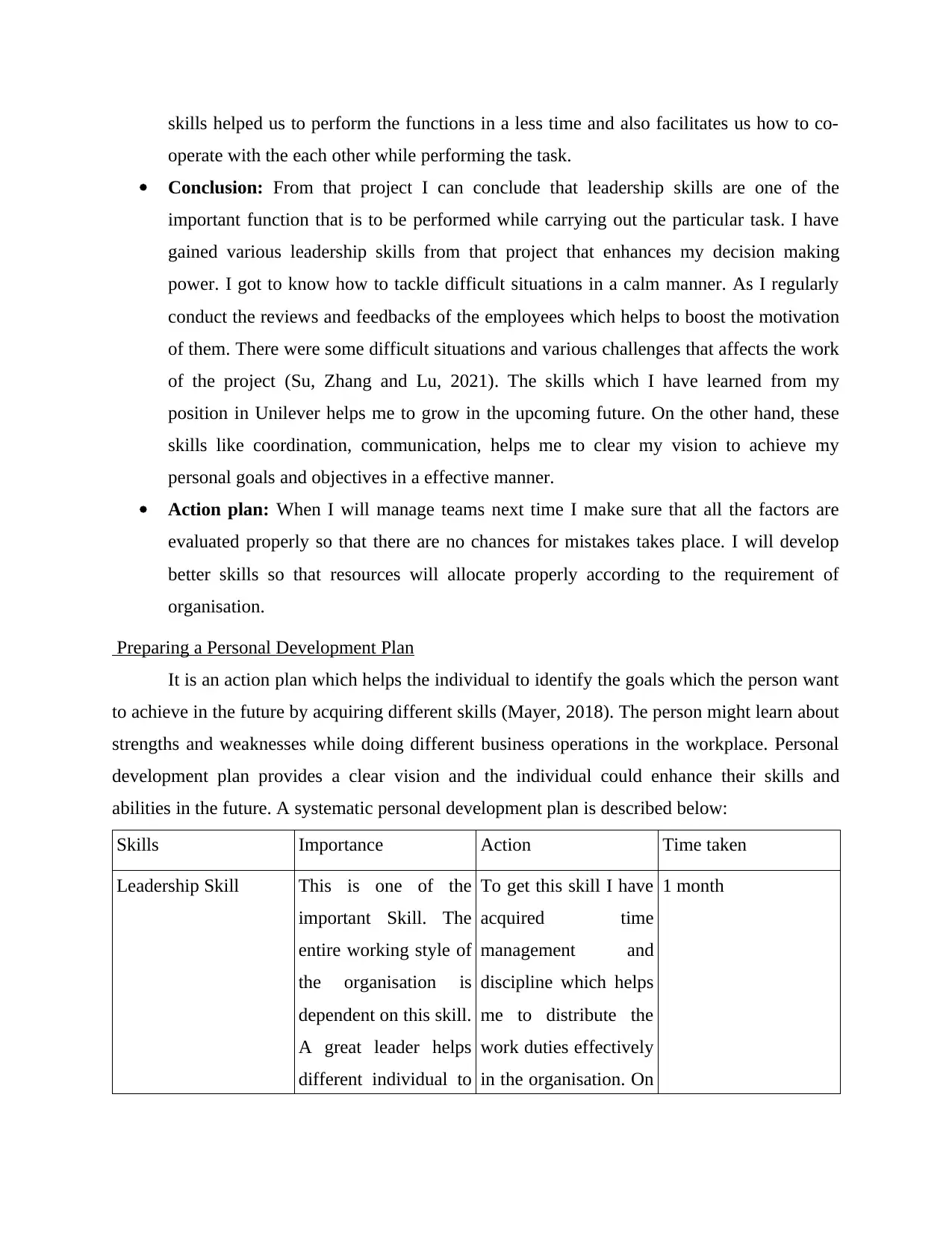
skills helped us to perform the functions in a less time and also facilitates us how to co-
operate with the each other while performing the task.
Conclusion: From that project I can conclude that leadership skills are one of the
important function that is to be performed while carrying out the particular task. I have
gained various leadership skills from that project that enhances my decision making
power. I got to know how to tackle difficult situations in a calm manner. As I regularly
conduct the reviews and feedbacks of the employees which helps to boost the motivation
of them. There were some difficult situations and various challenges that affects the work
of the project (Su, Zhang and Lu, 2021). The skills which I have learned from my
position in Unilever helps me to grow in the upcoming future. On the other hand, these
skills like coordination, communication, helps me to clear my vision to achieve my
personal goals and objectives in a effective manner.
Action plan: When I will manage teams next time I make sure that all the factors are
evaluated properly so that there are no chances for mistakes takes place. I will develop
better skills so that resources will allocate properly according to the requirement of
organisation.
Preparing a Personal Development Plan
It is an action plan which helps the individual to identify the goals which the person want
to achieve in the future by acquiring different skills (Mayer, 2018). The person might learn about
strengths and weaknesses while doing different business operations in the workplace. Personal
development plan provides a clear vision and the individual could enhance their skills and
abilities in the future. A systematic personal development plan is described below:
Skills Importance Action Time taken
Leadership Skill This is one of the
important Skill. The
entire working style of
the organisation is
dependent on this skill.
A great leader helps
different individual to
To get this skill I have
acquired time
management and
discipline which helps
me to distribute the
work duties effectively
in the organisation. On
1 month
operate with the each other while performing the task.
Conclusion: From that project I can conclude that leadership skills are one of the
important function that is to be performed while carrying out the particular task. I have
gained various leadership skills from that project that enhances my decision making
power. I got to know how to tackle difficult situations in a calm manner. As I regularly
conduct the reviews and feedbacks of the employees which helps to boost the motivation
of them. There were some difficult situations and various challenges that affects the work
of the project (Su, Zhang and Lu, 2021). The skills which I have learned from my
position in Unilever helps me to grow in the upcoming future. On the other hand, these
skills like coordination, communication, helps me to clear my vision to achieve my
personal goals and objectives in a effective manner.
Action plan: When I will manage teams next time I make sure that all the factors are
evaluated properly so that there are no chances for mistakes takes place. I will develop
better skills so that resources will allocate properly according to the requirement of
organisation.
Preparing a Personal Development Plan
It is an action plan which helps the individual to identify the goals which the person want
to achieve in the future by acquiring different skills (Mayer, 2018). The person might learn about
strengths and weaknesses while doing different business operations in the workplace. Personal
development plan provides a clear vision and the individual could enhance their skills and
abilities in the future. A systematic personal development plan is described below:
Skills Importance Action Time taken
Leadership Skill This is one of the
important Skill. The
entire working style of
the organisation is
dependent on this skill.
A great leader helps
different individual to
To get this skill I have
acquired time
management and
discipline which helps
me to distribute the
work duties effectively
in the organisation. On
1 month
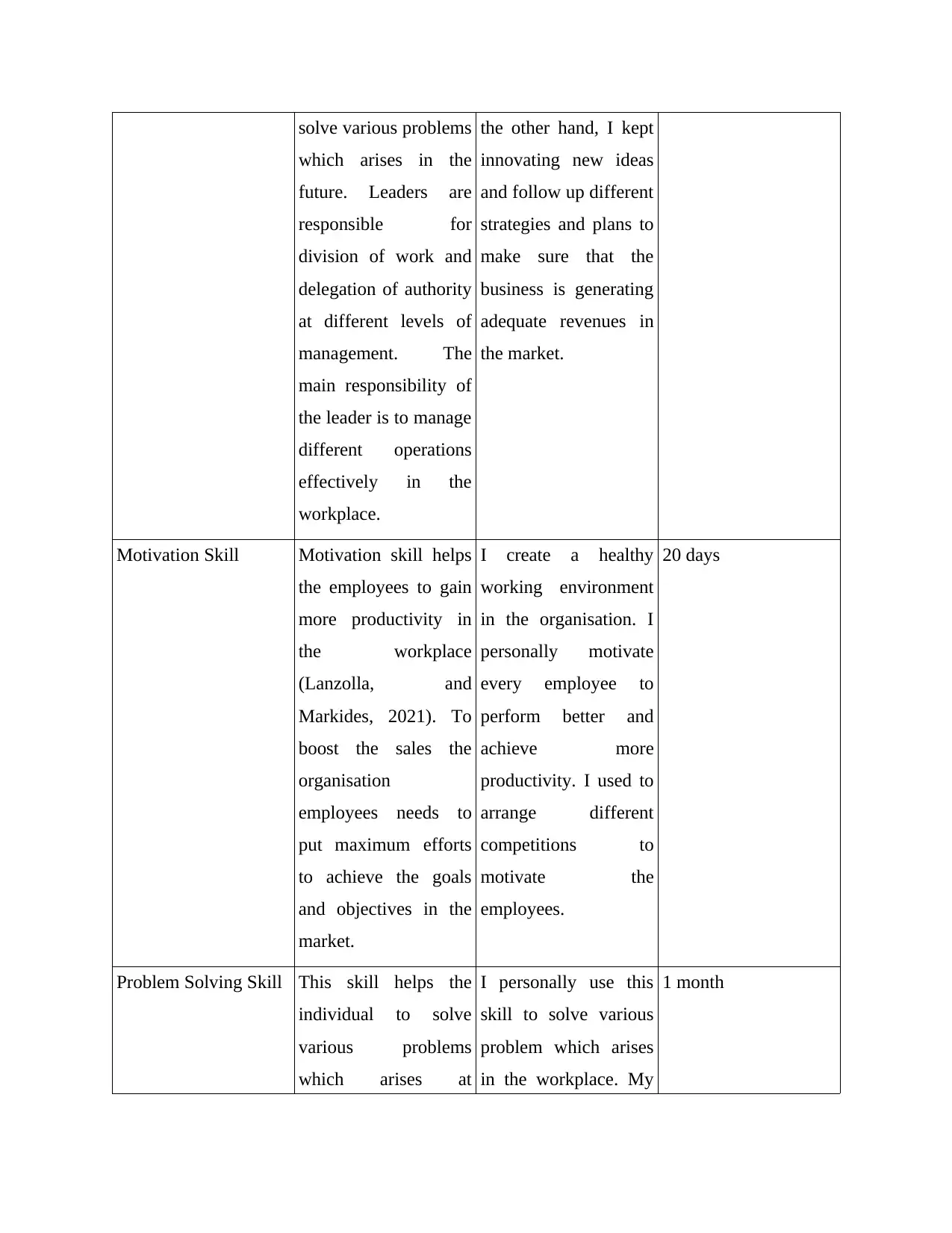
solve various problems
which arises in the
future. Leaders are
responsible for
division of work and
delegation of authority
at different levels of
management. The
main responsibility of
the leader is to manage
different operations
effectively in the
workplace.
the other hand, I kept
innovating new ideas
and follow up different
strategies and plans to
make sure that the
business is generating
adequate revenues in
the market.
Motivation Skill Motivation skill helps
the employees to gain
more productivity in
the workplace
(Lanzolla, and
Markides, 2021). To
boost the sales the
organisation
employees needs to
put maximum efforts
to achieve the goals
and objectives in the
market.
I create a healthy
working environment
in the organisation. I
personally motivate
every employee to
perform better and
achieve more
productivity. I used to
arrange different
competitions to
motivate the
employees.
20 days
Problem Solving Skill This skill helps the
individual to solve
various problems
which arises at
I personally use this
skill to solve various
problem which arises
in the workplace. My
1 month
which arises in the
future. Leaders are
responsible for
division of work and
delegation of authority
at different levels of
management. The
main responsibility of
the leader is to manage
different operations
effectively in the
workplace.
the other hand, I kept
innovating new ideas
and follow up different
strategies and plans to
make sure that the
business is generating
adequate revenues in
the market.
Motivation Skill Motivation skill helps
the employees to gain
more productivity in
the workplace
(Lanzolla, and
Markides, 2021). To
boost the sales the
organisation
employees needs to
put maximum efforts
to achieve the goals
and objectives in the
market.
I create a healthy
working environment
in the organisation. I
personally motivate
every employee to
perform better and
achieve more
productivity. I used to
arrange different
competitions to
motivate the
employees.
20 days
Problem Solving Skill This skill helps the
individual to solve
various problems
which arises at
I personally use this
skill to solve various
problem which arises
in the workplace. My
1 month
⊘ This is a preview!⊘
Do you want full access?
Subscribe today to unlock all pages.

Trusted by 1+ million students worldwide
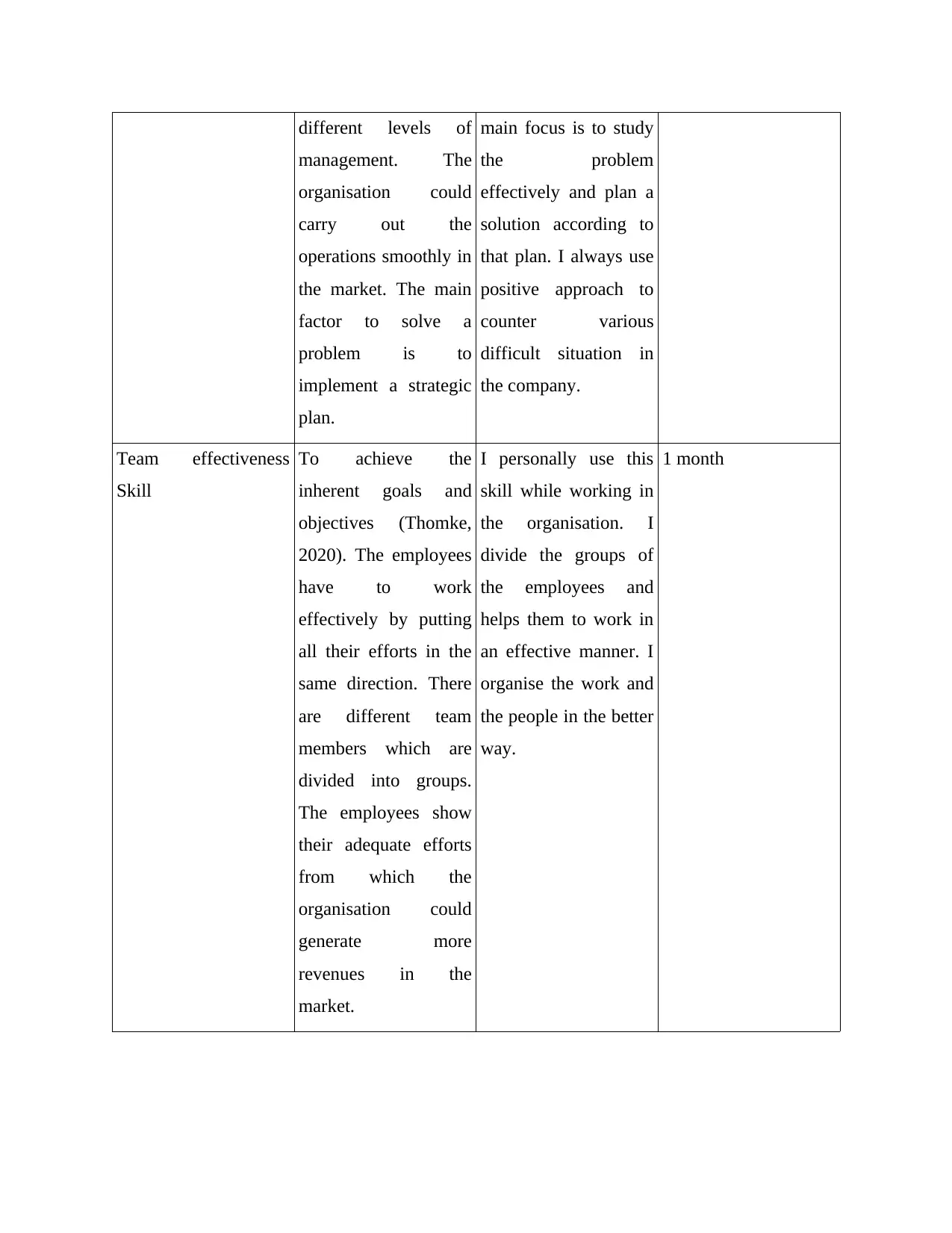
different levels of
management. The
organisation could
carry out the
operations smoothly in
the market. The main
factor to solve a
problem is to
implement a strategic
plan.
main focus is to study
the problem
effectively and plan a
solution according to
that plan. I always use
positive approach to
counter various
difficult situation in
the company.
Team effectiveness
Skill
To achieve the
inherent goals and
objectives (Thomke,
2020). The employees
have to work
effectively by putting
all their efforts in the
same direction. There
are different team
members which are
divided into groups.
The employees show
their adequate efforts
from which the
organisation could
generate more
revenues in the
market.
I personally use this
skill while working in
the organisation. I
divide the groups of
the employees and
helps them to work in
an effective manner. I
organise the work and
the people in the better
way.
1 month
management. The
organisation could
carry out the
operations smoothly in
the market. The main
factor to solve a
problem is to
implement a strategic
plan.
main focus is to study
the problem
effectively and plan a
solution according to
that plan. I always use
positive approach to
counter various
difficult situation in
the company.
Team effectiveness
Skill
To achieve the
inherent goals and
objectives (Thomke,
2020). The employees
have to work
effectively by putting
all their efforts in the
same direction. There
are different team
members which are
divided into groups.
The employees show
their adequate efforts
from which the
organisation could
generate more
revenues in the
market.
I personally use this
skill while working in
the organisation. I
divide the groups of
the employees and
helps them to work in
an effective manner. I
organise the work and
the people in the better
way.
1 month
Paraphrase This Document
Need a fresh take? Get an instant paraphrase of this document with our AI Paraphraser
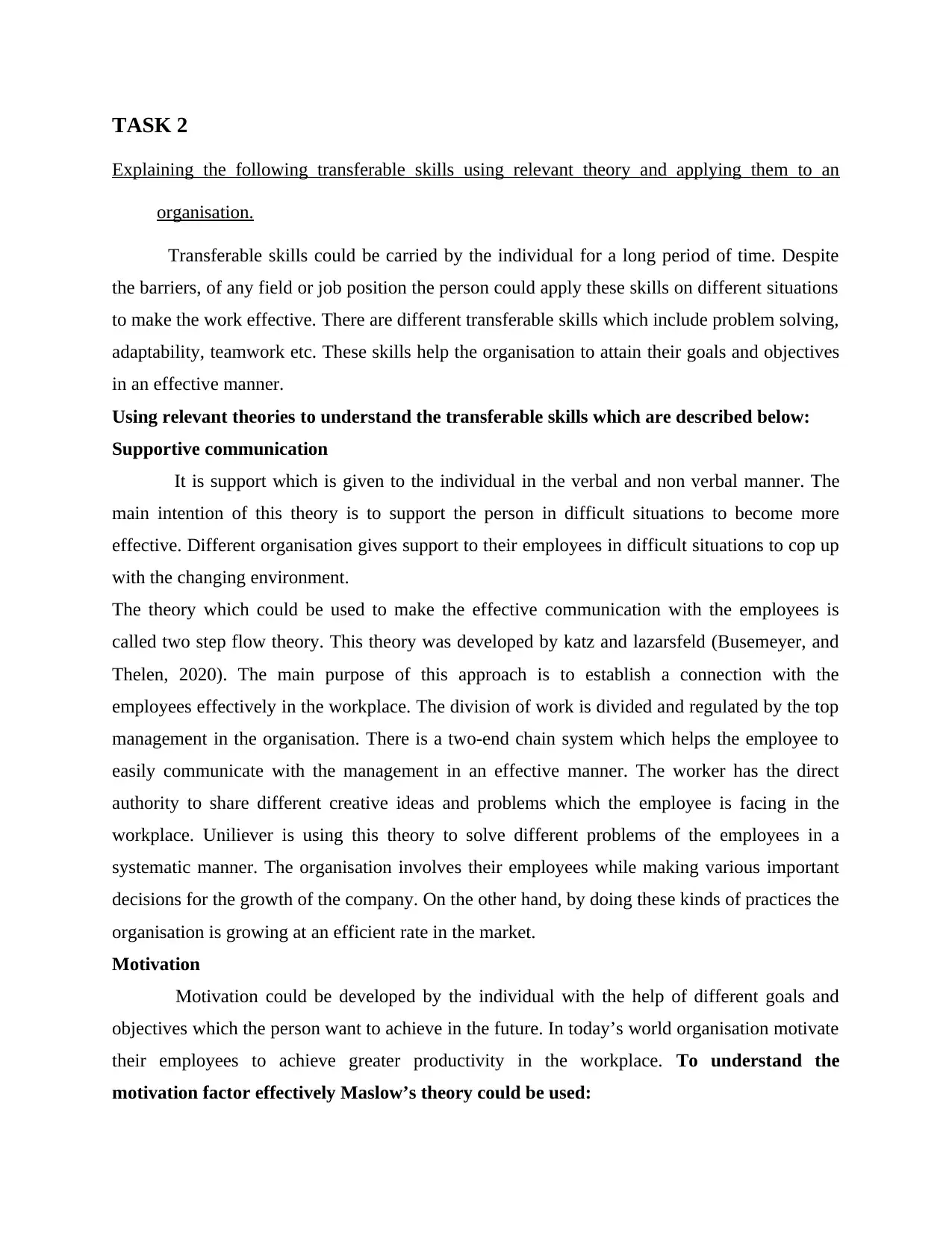
TASK 2
Explaining the following transferable skills using relevant theory and applying them to an
organisation.
Transferable skills could be carried by the individual for a long period of time. Despite
the barriers, of any field or job position the person could apply these skills on different situations
to make the work effective. There are different transferable skills which include problem solving,
adaptability, teamwork etc. These skills help the organisation to attain their goals and objectives
in an effective manner.
Using relevant theories to understand the transferable skills which are described below:
Supportive communication
It is support which is given to the individual in the verbal and non verbal manner. The
main intention of this theory is to support the person in difficult situations to become more
effective. Different organisation gives support to their employees in difficult situations to cop up
with the changing environment.
The theory which could be used to make the effective communication with the employees is
called two step flow theory. This theory was developed by katz and lazarsfeld (Busemeyer, and
Thelen, 2020). The main purpose of this approach is to establish a connection with the
employees effectively in the workplace. The division of work is divided and regulated by the top
management in the organisation. There is a two-end chain system which helps the employee to
easily communicate with the management in an effective manner. The worker has the direct
authority to share different creative ideas and problems which the employee is facing in the
workplace. Uniliever is using this theory to solve different problems of the employees in a
systematic manner. The organisation involves their employees while making various important
decisions for the growth of the company. On the other hand, by doing these kinds of practices the
organisation is growing at an efficient rate in the market.
Motivation
Motivation could be developed by the individual with the help of different goals and
objectives which the person want to achieve in the future. In today’s world organisation motivate
their employees to achieve greater productivity in the workplace. To understand the
motivation factor effectively Maslow’s theory could be used:
Explaining the following transferable skills using relevant theory and applying them to an
organisation.
Transferable skills could be carried by the individual for a long period of time. Despite
the barriers, of any field or job position the person could apply these skills on different situations
to make the work effective. There are different transferable skills which include problem solving,
adaptability, teamwork etc. These skills help the organisation to attain their goals and objectives
in an effective manner.
Using relevant theories to understand the transferable skills which are described below:
Supportive communication
It is support which is given to the individual in the verbal and non verbal manner. The
main intention of this theory is to support the person in difficult situations to become more
effective. Different organisation gives support to their employees in difficult situations to cop up
with the changing environment.
The theory which could be used to make the effective communication with the employees is
called two step flow theory. This theory was developed by katz and lazarsfeld (Busemeyer, and
Thelen, 2020). The main purpose of this approach is to establish a connection with the
employees effectively in the workplace. The division of work is divided and regulated by the top
management in the organisation. There is a two-end chain system which helps the employee to
easily communicate with the management in an effective manner. The worker has the direct
authority to share different creative ideas and problems which the employee is facing in the
workplace. Uniliever is using this theory to solve different problems of the employees in a
systematic manner. The organisation involves their employees while making various important
decisions for the growth of the company. On the other hand, by doing these kinds of practices the
organisation is growing at an efficient rate in the market.
Motivation
Motivation could be developed by the individual with the help of different goals and
objectives which the person want to achieve in the future. In today’s world organisation motivate
their employees to achieve greater productivity in the workplace. To understand the
motivation factor effectively Maslow’s theory could be used:
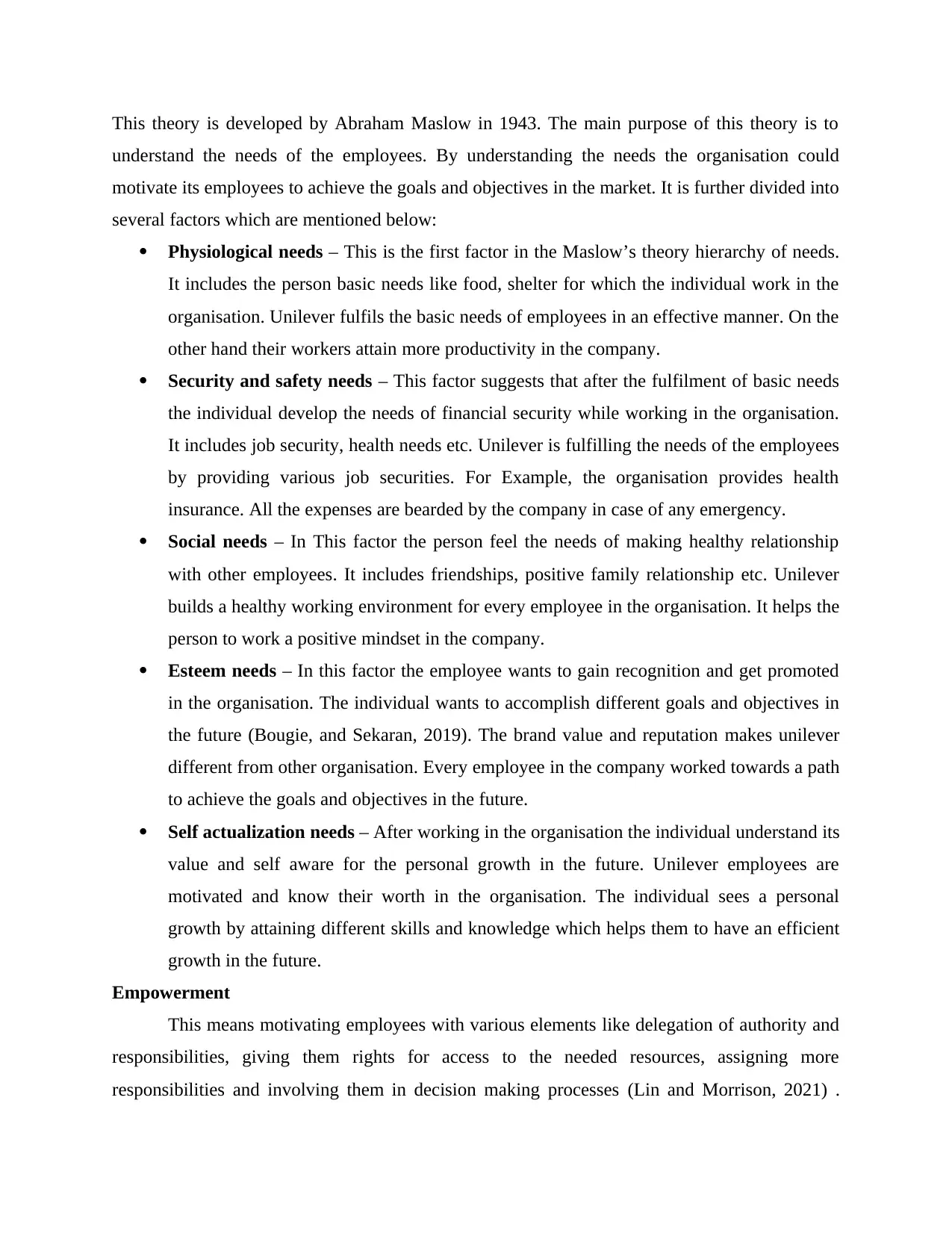
This theory is developed by Abraham Maslow in 1943. The main purpose of this theory is to
understand the needs of the employees. By understanding the needs the organisation could
motivate its employees to achieve the goals and objectives in the market. It is further divided into
several factors which are mentioned below:
Physiological needs – This is the first factor in the Maslow’s theory hierarchy of needs.
It includes the person basic needs like food, shelter for which the individual work in the
organisation. Unilever fulfils the basic needs of employees in an effective manner. On the
other hand their workers attain more productivity in the company.
Security and safety needs – This factor suggests that after the fulfilment of basic needs
the individual develop the needs of financial security while working in the organisation.
It includes job security, health needs etc. Unilever is fulfilling the needs of the employees
by providing various job securities. For Example, the organisation provides health
insurance. All the expenses are bearded by the company in case of any emergency.
Social needs – In This factor the person feel the needs of making healthy relationship
with other employees. It includes friendships, positive family relationship etc. Unilever
builds a healthy working environment for every employee in the organisation. It helps the
person to work a positive mindset in the company.
Esteem needs – In this factor the employee wants to gain recognition and get promoted
in the organisation. The individual wants to accomplish different goals and objectives in
the future (Bougie, and Sekaran, 2019). The brand value and reputation makes unilever
different from other organisation. Every employee in the company worked towards a path
to achieve the goals and objectives in the future.
Self actualization needs – After working in the organisation the individual understand its
value and self aware for the personal growth in the future. Unilever employees are
motivated and know their worth in the organisation. The individual sees a personal
growth by attaining different skills and knowledge which helps them to have an efficient
growth in the future.
Empowerment
This means motivating employees with various elements like delegation of authority and
responsibilities, giving them rights for access to the needed resources, assigning more
responsibilities and involving them in decision making processes (Lin and Morrison, 2021) .
understand the needs of the employees. By understanding the needs the organisation could
motivate its employees to achieve the goals and objectives in the market. It is further divided into
several factors which are mentioned below:
Physiological needs – This is the first factor in the Maslow’s theory hierarchy of needs.
It includes the person basic needs like food, shelter for which the individual work in the
organisation. Unilever fulfils the basic needs of employees in an effective manner. On the
other hand their workers attain more productivity in the company.
Security and safety needs – This factor suggests that after the fulfilment of basic needs
the individual develop the needs of financial security while working in the organisation.
It includes job security, health needs etc. Unilever is fulfilling the needs of the employees
by providing various job securities. For Example, the organisation provides health
insurance. All the expenses are bearded by the company in case of any emergency.
Social needs – In This factor the person feel the needs of making healthy relationship
with other employees. It includes friendships, positive family relationship etc. Unilever
builds a healthy working environment for every employee in the organisation. It helps the
person to work a positive mindset in the company.
Esteem needs – In this factor the employee wants to gain recognition and get promoted
in the organisation. The individual wants to accomplish different goals and objectives in
the future (Bougie, and Sekaran, 2019). The brand value and reputation makes unilever
different from other organisation. Every employee in the company worked towards a path
to achieve the goals and objectives in the future.
Self actualization needs – After working in the organisation the individual understand its
value and self aware for the personal growth in the future. Unilever employees are
motivated and know their worth in the organisation. The individual sees a personal
growth by attaining different skills and knowledge which helps them to have an efficient
growth in the future.
Empowerment
This means motivating employees with various elements like delegation of authority and
responsibilities, giving them rights for access to the needed resources, assigning more
responsibilities and involving them in decision making processes (Lin and Morrison, 2021) .
⊘ This is a preview!⊘
Do you want full access?
Subscribe today to unlock all pages.

Trusted by 1+ million students worldwide
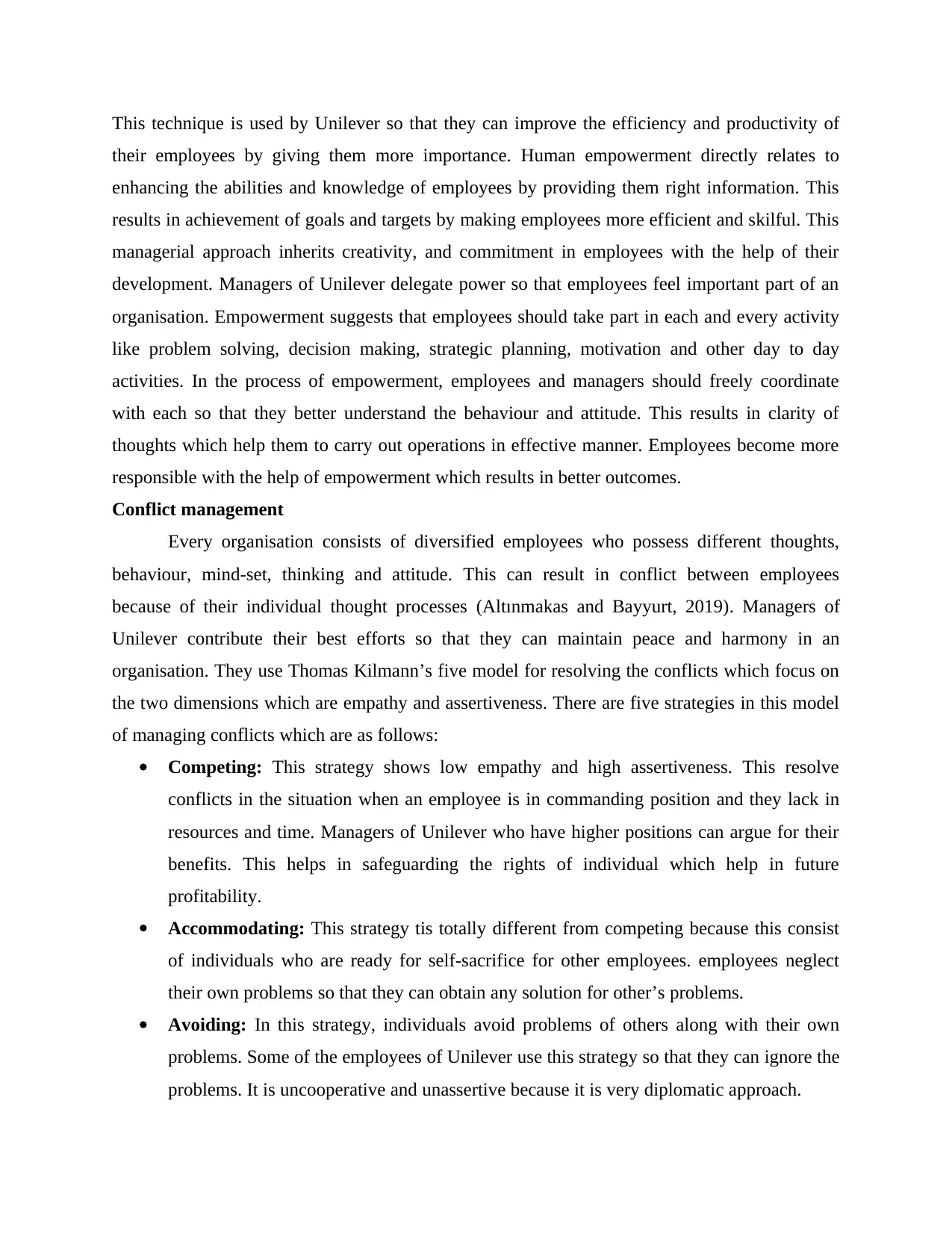
This technique is used by Unilever so that they can improve the efficiency and productivity of
their employees by giving them more importance. Human empowerment directly relates to
enhancing the abilities and knowledge of employees by providing them right information. This
results in achievement of goals and targets by making employees more efficient and skilful. This
managerial approach inherits creativity, and commitment in employees with the help of their
development. Managers of Unilever delegate power so that employees feel important part of an
organisation. Empowerment suggests that employees should take part in each and every activity
like problem solving, decision making, strategic planning, motivation and other day to day
activities. In the process of empowerment, employees and managers should freely coordinate
with each so that they better understand the behaviour and attitude. This results in clarity of
thoughts which help them to carry out operations in effective manner. Employees become more
responsible with the help of empowerment which results in better outcomes.
Conflict management
Every organisation consists of diversified employees who possess different thoughts,
behaviour, mind-set, thinking and attitude. This can result in conflict between employees
because of their individual thought processes (Altınmakas and Bayyurt, 2019). Managers of
Unilever contribute their best efforts so that they can maintain peace and harmony in an
organisation. They use Thomas Kilmann’s five model for resolving the conflicts which focus on
the two dimensions which are empathy and assertiveness. There are five strategies in this model
of managing conflicts which are as follows:
Competing: This strategy shows low empathy and high assertiveness. This resolve
conflicts in the situation when an employee is in commanding position and they lack in
resources and time. Managers of Unilever who have higher positions can argue for their
benefits. This helps in safeguarding the rights of individual which help in future
profitability.
Accommodating: This strategy tis totally different from competing because this consist
of individuals who are ready for self-sacrifice for other employees. employees neglect
their own problems so that they can obtain any solution for other’s problems.
Avoiding: In this strategy, individuals avoid problems of others along with their own
problems. Some of the employees of Unilever use this strategy so that they can ignore the
problems. It is uncooperative and unassertive because it is very diplomatic approach.
their employees by giving them more importance. Human empowerment directly relates to
enhancing the abilities and knowledge of employees by providing them right information. This
results in achievement of goals and targets by making employees more efficient and skilful. This
managerial approach inherits creativity, and commitment in employees with the help of their
development. Managers of Unilever delegate power so that employees feel important part of an
organisation. Empowerment suggests that employees should take part in each and every activity
like problem solving, decision making, strategic planning, motivation and other day to day
activities. In the process of empowerment, employees and managers should freely coordinate
with each so that they better understand the behaviour and attitude. This results in clarity of
thoughts which help them to carry out operations in effective manner. Employees become more
responsible with the help of empowerment which results in better outcomes.
Conflict management
Every organisation consists of diversified employees who possess different thoughts,
behaviour, mind-set, thinking and attitude. This can result in conflict between employees
because of their individual thought processes (Altınmakas and Bayyurt, 2019). Managers of
Unilever contribute their best efforts so that they can maintain peace and harmony in an
organisation. They use Thomas Kilmann’s five model for resolving the conflicts which focus on
the two dimensions which are empathy and assertiveness. There are five strategies in this model
of managing conflicts which are as follows:
Competing: This strategy shows low empathy and high assertiveness. This resolve
conflicts in the situation when an employee is in commanding position and they lack in
resources and time. Managers of Unilever who have higher positions can argue for their
benefits. This helps in safeguarding the rights of individual which help in future
profitability.
Accommodating: This strategy tis totally different from competing because this consist
of individuals who are ready for self-sacrifice for other employees. employees neglect
their own problems so that they can obtain any solution for other’s problems.
Avoiding: In this strategy, individuals avoid problems of others along with their own
problems. Some of the employees of Unilever use this strategy so that they can ignore the
problems. It is uncooperative and unassertive because it is very diplomatic approach.
Paraphrase This Document
Need a fresh take? Get an instant paraphrase of this document with our AI Paraphraser
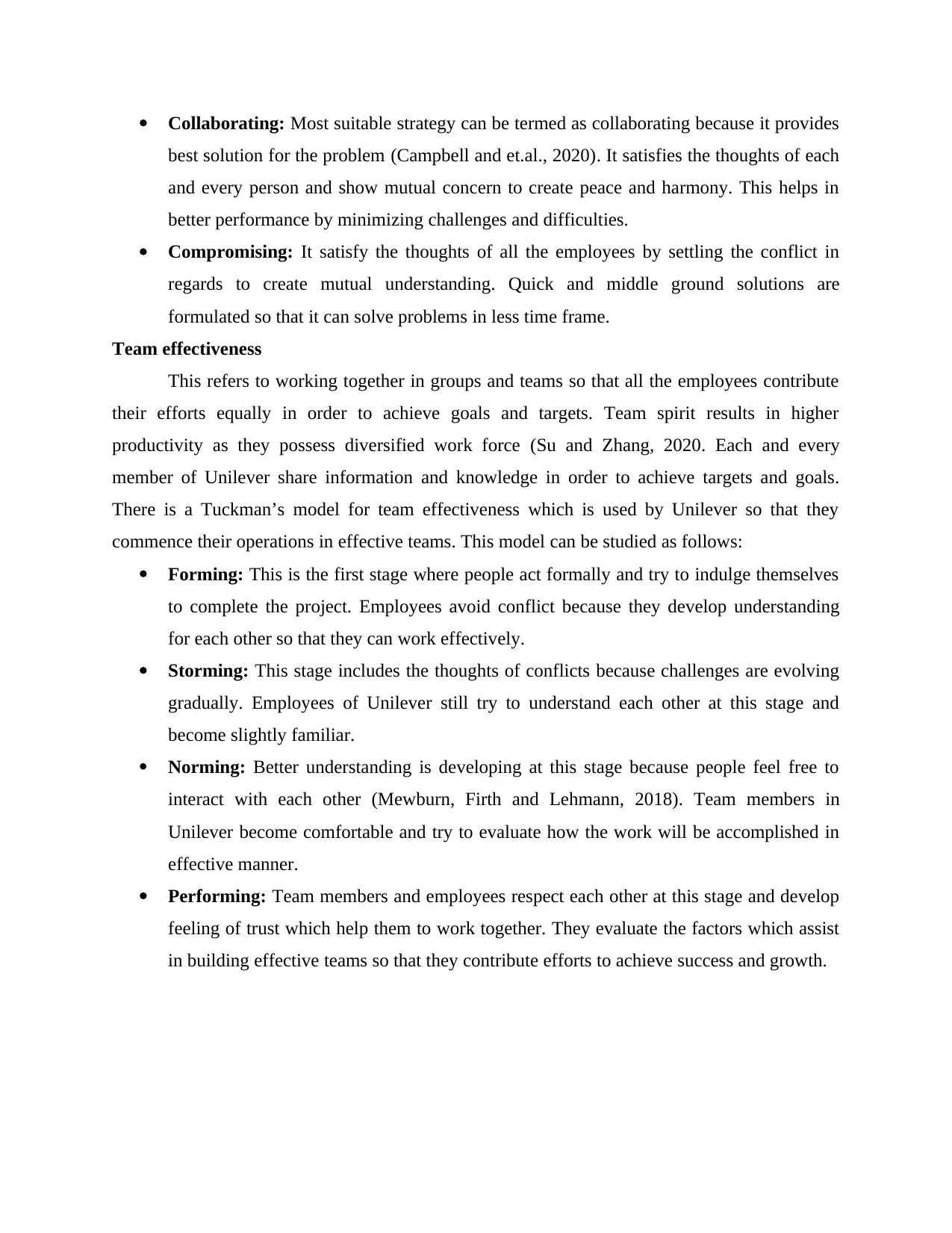
Collaborating: Most suitable strategy can be termed as collaborating because it provides
best solution for the problem (Campbell and et.al., 2020). It satisfies the thoughts of each
and every person and show mutual concern to create peace and harmony. This helps in
better performance by minimizing challenges and difficulties.
Compromising: It satisfy the thoughts of all the employees by settling the conflict in
regards to create mutual understanding. Quick and middle ground solutions are
formulated so that it can solve problems in less time frame.
Team effectiveness
This refers to working together in groups and teams so that all the employees contribute
their efforts equally in order to achieve goals and targets. Team spirit results in higher
productivity as they possess diversified work force (Su and Zhang, 2020. Each and every
member of Unilever share information and knowledge in order to achieve targets and goals.
There is a Tuckman’s model for team effectiveness which is used by Unilever so that they
commence their operations in effective teams. This model can be studied as follows:
Forming: This is the first stage where people act formally and try to indulge themselves
to complete the project. Employees avoid conflict because they develop understanding
for each other so that they can work effectively.
Storming: This stage includes the thoughts of conflicts because challenges are evolving
gradually. Employees of Unilever still try to understand each other at this stage and
become slightly familiar.
Norming: Better understanding is developing at this stage because people feel free to
interact with each other (Mewburn, Firth and Lehmann, 2018). Team members in
Unilever become comfortable and try to evaluate how the work will be accomplished in
effective manner.
Performing: Team members and employees respect each other at this stage and develop
feeling of trust which help them to work together. They evaluate the factors which assist
in building effective teams so that they contribute efforts to achieve success and growth.
best solution for the problem (Campbell and et.al., 2020). It satisfies the thoughts of each
and every person and show mutual concern to create peace and harmony. This helps in
better performance by minimizing challenges and difficulties.
Compromising: It satisfy the thoughts of all the employees by settling the conflict in
regards to create mutual understanding. Quick and middle ground solutions are
formulated so that it can solve problems in less time frame.
Team effectiveness
This refers to working together in groups and teams so that all the employees contribute
their efforts equally in order to achieve goals and targets. Team spirit results in higher
productivity as they possess diversified work force (Su and Zhang, 2020. Each and every
member of Unilever share information and knowledge in order to achieve targets and goals.
There is a Tuckman’s model for team effectiveness which is used by Unilever so that they
commence their operations in effective teams. This model can be studied as follows:
Forming: This is the first stage where people act formally and try to indulge themselves
to complete the project. Employees avoid conflict because they develop understanding
for each other so that they can work effectively.
Storming: This stage includes the thoughts of conflicts because challenges are evolving
gradually. Employees of Unilever still try to understand each other at this stage and
become slightly familiar.
Norming: Better understanding is developing at this stage because people feel free to
interact with each other (Mewburn, Firth and Lehmann, 2018). Team members in
Unilever become comfortable and try to evaluate how the work will be accomplished in
effective manner.
Performing: Team members and employees respect each other at this stage and develop
feeling of trust which help them to work together. They evaluate the factors which assist
in building effective teams so that they contribute efforts to achieve success and growth.
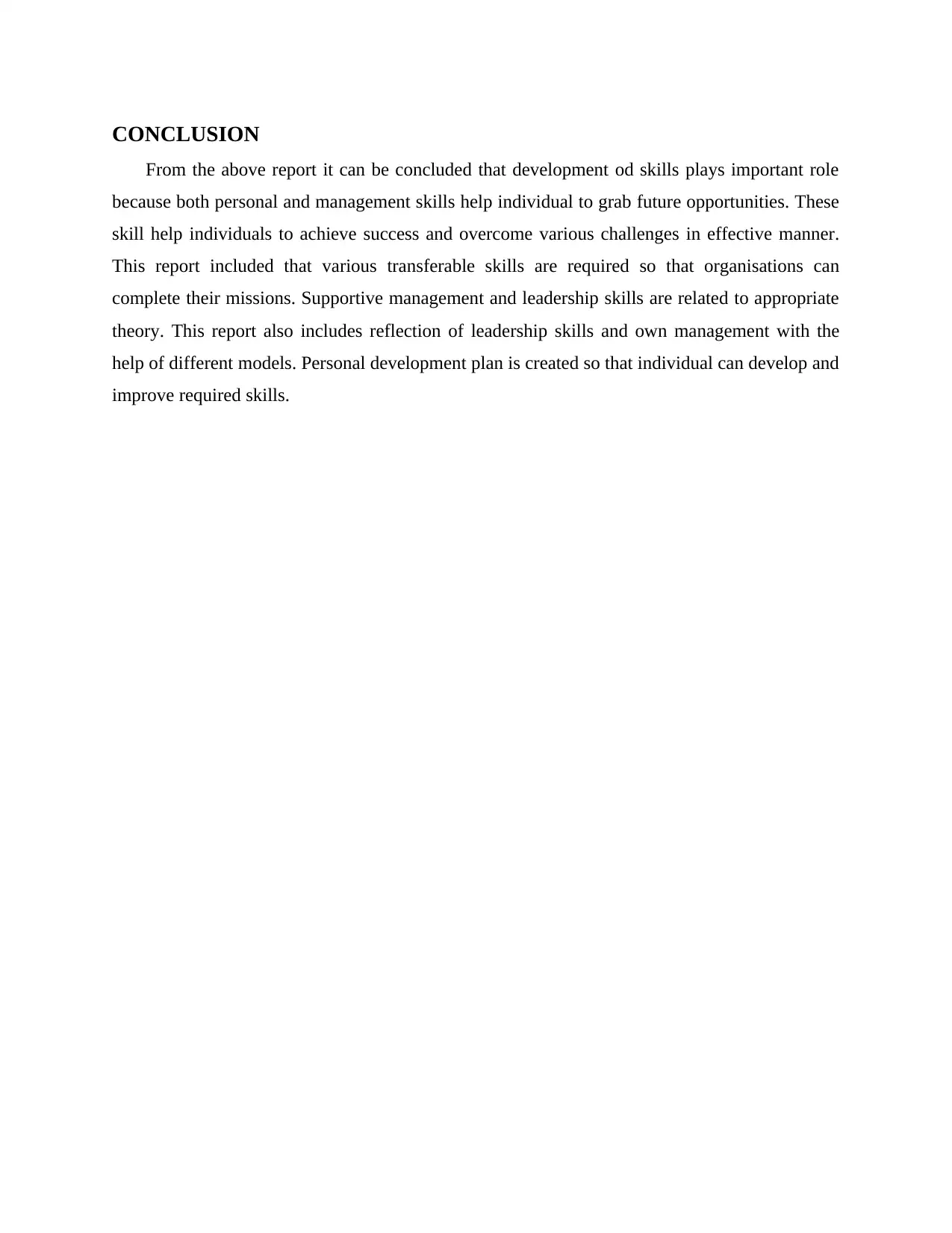
CONCLUSION
From the above report it can be concluded that development od skills plays important role
because both personal and management skills help individual to grab future opportunities. These
skill help individuals to achieve success and overcome various challenges in effective manner.
This report included that various transferable skills are required so that organisations can
complete their missions. Supportive management and leadership skills are related to appropriate
theory. This report also includes reflection of leadership skills and own management with the
help of different models. Personal development plan is created so that individual can develop and
improve required skills.
From the above report it can be concluded that development od skills plays important role
because both personal and management skills help individual to grab future opportunities. These
skill help individuals to achieve success and overcome various challenges in effective manner.
This report included that various transferable skills are required so that organisations can
complete their missions. Supportive management and leadership skills are related to appropriate
theory. This report also includes reflection of leadership skills and own management with the
help of different models. Personal development plan is created so that individual can develop and
improve required skills.
⊘ This is a preview!⊘
Do you want full access?
Subscribe today to unlock all pages.

Trusted by 1+ million students worldwide
1 out of 14
Related Documents
Your All-in-One AI-Powered Toolkit for Academic Success.
+13062052269
info@desklib.com
Available 24*7 on WhatsApp / Email
![[object Object]](/_next/static/media/star-bottom.7253800d.svg)
Unlock your academic potential
Copyright © 2020–2026 A2Z Services. All Rights Reserved. Developed and managed by ZUCOL.




